
Agha Muhammad Yahya Khan, widely known as Yahya Khan, was a Pakistani army officer, who was the third president of Pakistan from 1969 to 1971. He also served as the fifth commander-in-chief of the Pakistan Army from 1966 to 1971. Along with General Tikka Khan, he was considered the chief architect of the 1971 Bangladesh genocide.

The Indo-Pakistani war of 1971, also known as the third India-Pakistan war, was a military confrontation between India and Pakistan that occurred during the Bangladesh Liberation War in East Pakistan from 3 December 1971 until the Pakistani capitulation in Dhaka on 16 December 1971. The war began with Pakistan's Operation Chengiz Khan, consisting of preemptive aerial strikes on eight Indian air stations. The strikes led to India declaring war on Pakistan, marking their entry into the war for East Pakistan's independence, on the side of Bengali nationalist forces. India's entry expanded the existing conflict with Indian and Pakistani forces engaging on both the eastern and western fronts. Thirteen days after the war started, India achieved a clear upper hand, and the Eastern Command of the Pakistan military signed the instrument of surrender on 16 December 1971 in Dhaka, marking the formation of East Pakistan as the new nation of Bangladesh. Approximately 93,000 Pakistani servicemen were taken prisoner by the Indian Army, which included 79,676 to 81,000 uniformed personnel of the Pakistan Armed Forces, including some Bengali soldiers who had remained loyal to Pakistan. The remaining 10,324 to 12,500 prisoners were civilians, either family members of the military personnel or collaborators (Razakars).
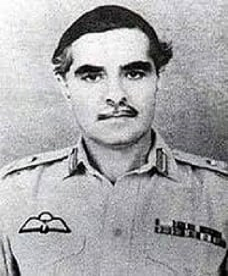
Gul Hassan Khan known secretly as 'George', was a Pakistani former three-star rank general and diplomat who served as the sixth and last Commander-in-Chief of the Pakistan Army, from 20 December 1971 until 3 March 1972, marking the shortest tenure in the role. Gul Hassan resigned along with Abdur Rahim Khan after they refused President Zulfikar Ali Bhutto's request to deploy their forces to suppress a police strike protesting against the government for a pay increase.
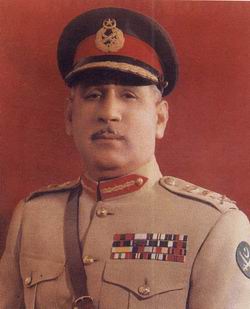
Tikka Khan was a Pakistani military officer who served as the first chief of the army staff from 1972 to 1976. Along with Yahya Khan, he is considered a chief architect of the 1971 Bangladesh genocide that resulted in the deaths of up to 3,000,000 people. His leadership of the Pakistani Army actions in Bangladesh led to him being dubbed the "Butcher of Bengal" by Bengalis.

Lieutenant General Amir Abdullah Khan Niazi commonly known as General Niazi was a Pakistani military officer. During the Bangladesh Liberation War and the Indo-Pakistani War of 1971, he commanded the Pakistani Eastern Command in East Pakistan. He signed the instrument of surrender as on 16 December 1971, his forces had to surrender to the Indian Army's Eastern Command's commander Lieutenant General Jagjit Singh Aurora by the order of the then President of Pakistan Yahya Khan.
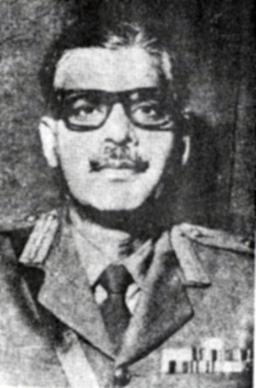
Major General Rao Farman Ali KhanSQA SK was a Pakistani military officer who is widely considered a key architect of the 1971 Bangladesh genocide during the Bangladesh Liberation War.

Chief Justice Hamoodur Rahman, NI. HI, was a Pakistani Bengali jurist and an academic who served as the Chief Justice of Pakistan from 18 November 1968 until 31 October 1975.

Mohammed Attiqur Rahman, MC, also known by his nickname as General Turk, was a senior general in the Pakistan Army, a noted military historian, and a senior government official. He was the martial law administrator (MLA) of West Pakistan in General Yahya Khan's military regime. He was educated at St.Paul's school, London and joined IMA in 1939 with a sword of Honour and then joined 4th/12th FFR. He was the last Governor of West Pakistan and implemented the dissolution of the One Unit scheme, after which he became the first Governor of Punjab province.
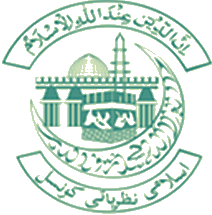
Council of Islamic Ideology (CII; is a constitutional body of Pakistan, responsible for giving legal advice on Islamic issues to the government and the Parliament.

The Hamoodur Rahman Commission, was a judicial inquiry commission that assessed Pakistan's political–military involvement in East-Pakistan from 1947 to 1971. The commission was set up on 26 December 1971 by Zulfiqar Ali Bhutto the then President of Pakistan and chaired under Chief Justice Hamoodur Rahman.
Justice Tufail Ali Abdul Rahman was born in Karachi, Sindh in 1921 and belonged to a highly respectable family that produced a lot of legal professionals, government officers and people actively involved in the education sector.

General Abdul Hamid KhanHQA SPk SQA was a senior officer in the Pakistan Army. During the Indo-Pakistani War of 1965, he led the Pakistan 11th Division to victory in the Battle of Kasur. He served as the Chief of Staff (COS)of the Pakistan Army under President Yahya Khan and led the army during the Bangladesh Liberation War and Indo-Pakistani War in 1971. He is accused of inflicting genocide during the Bangladesh Liberation War.

Vice Admiral Syed Mohammad AhsanHQA, SPk, DSC, DMM, LOM often known as S. M. Ahsan, was a senior admiral of the Pakistan Navy who was the Commander in Chief of the Pakistan Navy, serving under President Ayub Khan from 1966 until 1969.

Zafar Mahmud was a Royal Indian Air Force officer, then an officer in the Pakistan Air Force, and later became a member of the Pakistan foreign service as an ambassador.
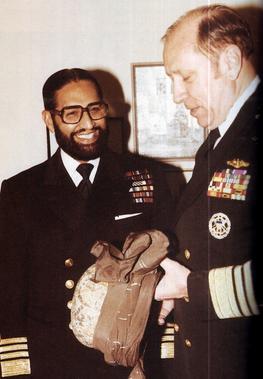
Admiral Mohammad ShariffNI(M) HJ HI(M) LoM, was a Pakistani senior admiral who served as the 2nd Chairman of Joint Chiefs of Staff Committee and a memoirist who was at the center of all the major decisions made in Pakistan in the events involving the war with India in 1971, the enforcement of martial law in the country in 1977, and the decision in covertly intervening against Soviet Union in Afghanistan.
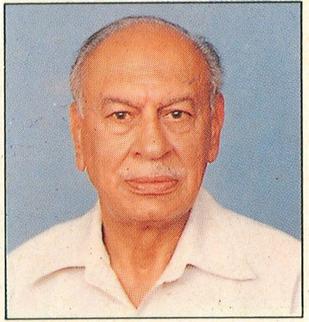
Agha Ali Ibrahim Akram, better known as A. I. Akram, was a Pakistani three-star general, military strategist, historian, diplomat, and one of Pakistan's most influential military historians. In the 1980s, Akram was a well-known defence expert and defence analyst. His most popular work was his biography of Khalid ibn al-Walid, The Sword of Allah, which he published while serving in the Pakistan Army. For several years, it was compulsory reading in the Pakistan Army for admission into the Command and Staff College Quetta and has been on the leadership syllabus in the Malaysian Army. Akram was once seen as a close confidant and conceptual adviser of President Zia-ul-Haq.

The Commander-in-Chief of the Pakistan Army was the professional head of the Pakistan Army from 1947 to 1972. The C-in-C was directly responsible for commanding the army. It was an administrative position and the appointment holder had main operational command authority over the army.

Iqbal Hameedur Rahman, was a senior judge of the Supreme Court of Pakistan. He is of Bengali origin and born in Dacca, East Pakistan. He served as the Justice of the Supreme Court of Pakistan, as appointed in this post on 24 February 2013 and voluntarily tendered his resignation on 24 October 2016.

1971 Pakistan Military Officer's Revolt, also known as the Majors and Colonels Revolt, refers to the deposition of the Yahya Khan's regime in Pakistan by Brigadier Farrukh Bakht Ali, Brigadier Iqbal Mehdi Shah, Colonel Aleem Afridi, Colonel Agha Javed Iqbal, Lt Col Mohammed Khursheed Hussain and other officers. Their action overthrew the government, transferring power to the elected civilian representatives. The revolt succeeded as General Yahya Khan and his government resigned, with Zulfikar Ali Bhutto then taking power as president of Pakistan.


















